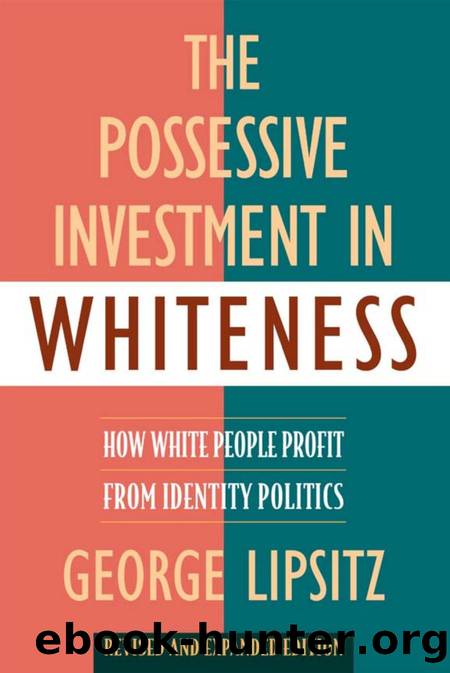The Possessive Investment in Whiteness: How White People Profit From Identity Politics, Revised and Expanded Edition by George Lipsitz

Author:George Lipsitz [Lipsitz, George]
Language: eng
Format: azw3, mobi, epub
Tags: Ethnic Studies, United States, General, Social Science, History
ISBN: 9781592134939
Publisher: Temple University Press
Published: 2006-03-17T00:00:00+00:00
C H A P T E R
8
âSwing Low, Sweet Cadillacâ:
Antiblack Racism and White
Identity
White children, in the main, and whether they are rich or poor, grow up with a grasp of reality so feeble that they can very accurately be
described as deludedâabout themselves and
the world they live in. . . . The reason for this, at bottom, is that the doctrine of white
supremacy, which still controls most white
people, is itself a stupendous delusion: but to be born black in America is an immediate, a
mortal challenge.
âJAMES BALDWIN
People of color have never been merely passive victims of white supremacist power. The active agency of aggrieved communities has always served as an important counterweight to white power. In the process of defending themselves and advancing their own immediate interests, individuals and communities struggling against white supremacy have often created ways of knowing, forms of struggle, and visions of the future important to all people. Even seemingly insignificant cultural expressions often prove to be important reservoirs of collective memory and cultural critique about the possessive investment in whiteness. Scholarly studies of racism in the United States suffer when they fail to recognize the knowledge about social relations contained in music, literature, and folklore, but those scholars who develop respect and understanding for popular ways of knowing can create highly enlightening and important works.
1 5 9
1 6 0
C H A P T E R 8
To uninitiated listeners, Dizzy Gillespieâs 1959 composition âSwing Low, Sweet Cadillacâ might have sounded trivial, frivolous, and insignificant.
Gillespie combined fragments of the spiritual âSwing Low, Sweet Chariotâ
with advertising jingles. He mixed jazz improvisation, Afro-Cuban drumming, Yoruba chants, rhythm-and-blues melodies, and quotes from General Douglas MacArthurâs famous 1951 farewell speech. Gillespieâs lyrics playfully imbued Cadillacs with the reverence that slaves a century earlier reserved for the chariots that they imagined would take them to heaven. He transposed General MacArthurâs line âOld soldiers never die, they just fade awayâ to âOld Cadillacs never die, the finance company just fades them away.â Yet for all its inventive contrasts, the humor and the seriousness encoded in âSwing Low, Sweet Cadillacâ
contained a communication of great significance.
Gillespieâs mischievous conflation of divinity with consumer desire in the song brought to the surface the connections between the secular and the sacred in the history of slavery and segregation in the United States. The slaves who sang about chariots coming to carry them home actually had no homes in this world, though their uncompensated labor created comfortable homes for others. Slaves owned no commodities, but their labor made it possible for others to accumulate assets, to ride in fine carriagesâwhile the legal and social systems transformed slaves from human persons to private property. In the antebellum period, abolitionists used spirituals like âSwing Low, Sweet Chariotâ
to remind the public of the slavesâ humanity by focusing attention on their faith, on their own assumptions about themselves as people with souls entitled to the fellowship in Christ promised to all by Christianity. Yet after emancipation, as Jon Cruzâs innovative research convincingly demonstrates, these same spirituals served fundamentally different purposes.
Download
The Possessive Investment in Whiteness: How White People Profit From Identity Politics, Revised and Expanded Edition by George Lipsitz.mobi
The Possessive Investment in Whiteness: How White People Profit From Identity Politics, Revised and Expanded Edition by George Lipsitz.epub
This site does not store any files on its server. We only index and link to content provided by other sites. Please contact the content providers to delete copyright contents if any and email us, we'll remove relevant links or contents immediately.
| General | Discrimination & Racism |
Nudge - Improving Decisions about Health, Wealth, and Happiness by Thaler Sunstein(7694)
The Fire Next Time by James Baldwin(5432)
iGen by Jean M. Twenge(5409)
Adulting by Kelly Williams Brown(4567)
The Sports Rules Book by Human Kinetics(4379)
The Hacking of the American Mind by Robert H. Lustig(4375)
The Ethical Slut by Janet W. Hardy(4243)
Captivate by Vanessa Van Edwards(3838)
Mummy Knew by Lisa James(3686)
In a Sunburned Country by Bill Bryson(3537)
The Worm at the Core by Sheldon Solomon(3486)
Ants Among Elephants by Sujatha Gidla(3463)
The 48 laws of power by Robert Greene & Joost Elffers(3254)
Suicide: A Study in Sociology by Emile Durkheim(3019)
The Slow Fix: Solve Problems, Work Smarter, and Live Better In a World Addicted to Speed by Carl Honore(3007)
The Tipping Point by Malcolm Gladwell(2914)
Humans of New York by Brandon Stanton(2868)
Handbook of Forensic Sociology and Psychology by Stephen J. Morewitz & Mark L. Goldstein(2704)
The Happy Hooker by Xaviera Hollander(2687)
